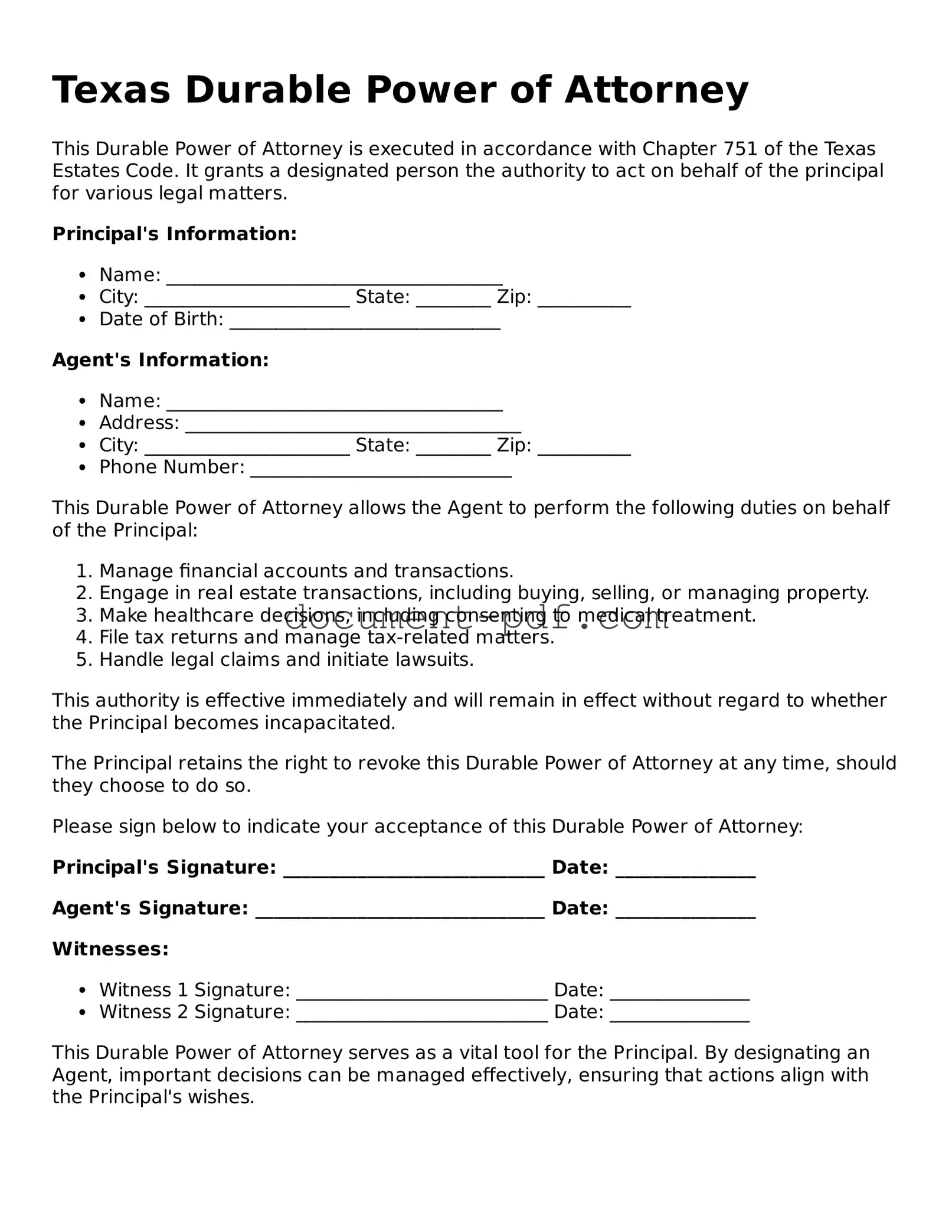The Texas Durable Power of Attorney form is often compared to a General Power of Attorney. Both documents grant authority to an agent to make decisions on behalf of the principal. However, the key difference lies in durability. A General Power of Attorney becomes invalid if the principal becomes incapacitated, while a Durable Power of Attorney remains effective even in such situations. This feature makes the Durable Power of Attorney particularly valuable for long-term planning.
Another similar document is the Medical Power of Attorney. While the Durable Power of Attorney can cover financial and legal matters, the Medical Power of Attorney specifically focuses on healthcare decisions. This document allows an agent to make medical choices for the principal if they are unable to do so themselves. Both forms require the principal to appoint a trusted individual, but their scopes are distinct—one for financial matters and the other for health-related decisions.
A Living Will is also akin to the Durable Power of Attorney, but it serves a different purpose. A Living Will outlines the principal’s wishes regarding end-of-life medical treatment. It specifies what kind of medical care one desires or does not desire in situations where they can no longer communicate their preferences. While the Durable Power of Attorney appoints someone to make decisions, the Living Will communicates the principal’s own wishes directly.
The Healthcare Proxy is another document similar to the Durable Power of Attorney, particularly in its focus on health-related decisions. This document allows an individual to designate someone to make healthcare decisions on their behalf. While both documents deal with the authority to make decisions, the Healthcare Proxy is specifically tailored for medical choices, whereas the Durable Power of Attorney can encompass a broader range of financial and legal matters.
A Revocable Living Trust shares similarities with the Durable Power of Attorney in that both can facilitate the management of assets. However, a Revocable Living Trust is a legal entity that holds assets during the principal's lifetime and specifies how they should be distributed after death. Unlike the Durable Power of Attorney, which grants authority to an agent, the Revocable Living Trust allows the principal to retain control over their assets while also providing a mechanism for seamless management if they become incapacitated.
For individuals seeking to document vehicle transactions, our platform offers guidance on the fundamental aspects of a Motor Vehicle Bill of Sale, which is crucial in ensuring a transparent exchange. You can explore our resources by visiting this essential guide on Motor Vehicle Bill of Sale.
The Guardian Appointment document is another related form. This document allows a person to designate a guardian for their minor children or dependents in case of their death or incapacity. While the Durable Power of Attorney is focused on financial and legal matters, the Guardian Appointment specifically addresses the care and custody of dependents, ensuring that their needs are met according to the principal's wishes.
A Financial Power of Attorney is closely related to the Durable Power of Attorney but may differ in terms of scope and specificity. The Financial Power of Attorney typically grants authority for specific financial matters, such as managing bank accounts or real estate transactions. In contrast, the Durable Power of Attorney can cover a broader range of financial and legal issues, providing more comprehensive authority to the appointed agent.
Lastly, the Business Power of Attorney can also be compared to the Durable Power of Attorney. This document allows someone to act on behalf of a business owner in business-related matters. While the Durable Power of Attorney is generally personal, the Business Power of Attorney is tailored for corporate or business decisions. Both forms empower an agent to act, but the contexts in which they operate are distinct, focusing on personal versus business affairs.

